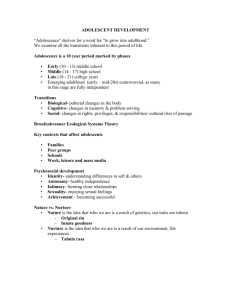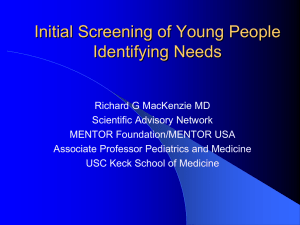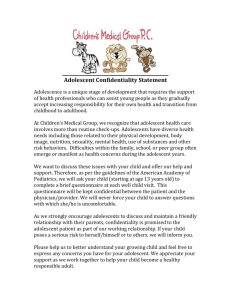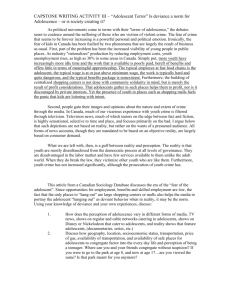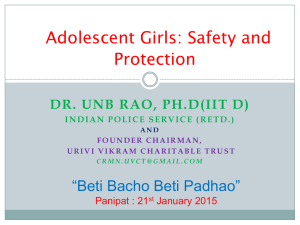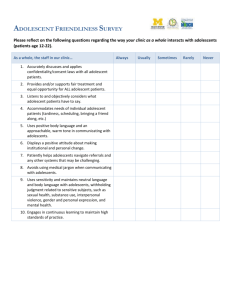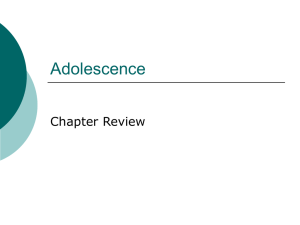Parental Involvement in Adolescent Peer Relationships Study Group -
advertisement
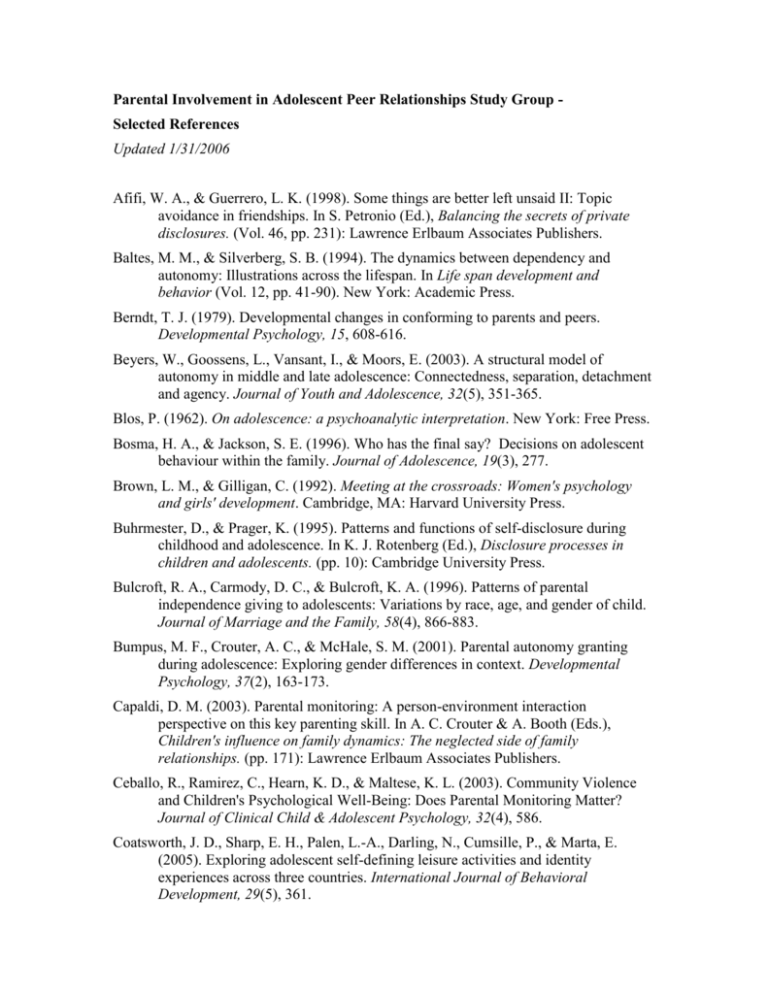
Parental Involvement in Adolescent Peer Relationships Study Group Selected References Updated 1/31/2006 Afifi, W. A., & Guerrero, L. K. (1998). Some things are better left unsaid II: Topic avoidance in friendships. In S. Petronio (Ed.), Balancing the secrets of private disclosures. (Vol. 46, pp. 231): Lawrence Erlbaum Associates Publishers. Baltes, M. M., & Silverberg, S. B. (1994). The dynamics between dependency and autonomy: Illustrations across the lifespan. In Life span development and behavior (Vol. 12, pp. 41-90). New York: Academic Press. Berndt, T. J. (1979). Developmental changes in conforming to parents and peers. Developmental Psychology, 15, 608-616. Beyers, W., Goossens, L., Vansant, I., & Moors, E. (2003). A structural model of autonomy in middle and late adolescence: Connectedness, separation, detachment and agency. Journal of Youth and Adolescence, 32(5), 351-365. Blos, P. (1962). On adolescence: a psychoanalytic interpretation. New York: Free Press. Bosma, H. A., & Jackson, S. E. (1996). Who has the final say? Decisions on adolescent behaviour within the family. Journal of Adolescence, 19(3), 277. Brown, L. M., & Gilligan, C. (1992). Meeting at the crossroads: Women's psychology and girls' development. Cambridge, MA: Harvard University Press. Buhrmester, D., & Prager, K. (1995). Patterns and functions of self-disclosure during childhood and adolescence. In K. J. Rotenberg (Ed.), Disclosure processes in children and adolescents. (pp. 10): Cambridge University Press. Bulcroft, R. A., Carmody, D. C., & Bulcroft, K. A. (1996). Patterns of parental independence giving to adolescents: Variations by race, age, and gender of child. Journal of Marriage and the Family, 58(4), 866-883. Bumpus, M. F., Crouter, A. C., & McHale, S. M. (2001). Parental autonomy granting during adolescence: Exploring gender differences in context. Developmental Psychology, 37(2), 163-173. Capaldi, D. M. (2003). Parental monitoring: A person-environment interaction perspective on this key parenting skill. In A. C. Crouter & A. Booth (Eds.), Children's influence on family dynamics: The neglected side of family relationships. (pp. 171): Lawrence Erlbaum Associates Publishers. Ceballo, R., Ramirez, C., Hearn, K. D., & Maltese, K. L. (2003). Community Violence and Children's Psychological Well-Being: Does Parental Monitoring Matter? Journal of Clinical Child & Adolescent Psychology, 32(4), 586. Coatsworth, J. D., Sharp, E. H., Palen, L.-A., Darling, N., Cumsille, P., & Marta, E. (2005). Exploring adolescent self-defining leisure activities and identity experiences across three countries. International Journal of Behavioral Development, 29(5), 361. Cohler, B. J., & Geyer, S. (1982). Psychological autonomy and interdependence within the family. In F. Walsh (Ed.), Normal family processes (pp. 196-226). New York: The Guilford Press. Collins, W. A., Gleason, T., & Sesma, A. J. (1997). Internalization, autonomy, and relationships: Development during adolescence. In J. E. Grusec & L. Kuczynski. (Eds.), Parenting and children's internalization of values: A handbook of contemporary theory (pp. 78-99). New York: Wiley. Collins, W. A., & Laursen, B. (2000). Adolescent relationships: The art of fugue. In Close relationships: A sourcebook. (pp. 59): Sage Publications, Inc. Collins, W. A., & Laursen, B. (2004a). Changing Relationships, Changing Youth: Interpersonal Contexts of Adolescent Development. Journal of Early Adolescence, 24(1), 55-62. Collins, W. A., & Laursen, B. (2004b). Parent-adolescent relationships and influences. In R. M. Lerner & L. Steinberg (Eds.), Handbook of Adolescent Psychology (2nd ed., pp. 331-361). Hoboken, N.J.: John Wiley & Sons, Inc. Collins, W. A., Laursen, B., Mortensen, N., Luebkar, C., & Ferreira, M. (1997). Conflict processes and transitions in parent and peer relationships: Implications for autonomy andregulation. Journal of Adolescent Research, 12(2), 178. Collins, W. A., & Luebker, C. (1994). Parent and adolescent expectancies: Individual and relational significance. In J. G. Smetana (Ed.), Beliefs about parenting: Origins and developmental implications. (pp. 65-80). San Francisco, CA, US: JosseyBass/Pfeiffer. Cooper, C. R., & Ayers-Lopex, S. (1985). Family and peer systems in early adolescence: New models of the role of relationships in development. Journal of Early Adolescence, 5, 9-21. Cooper, C. R., & Ayers-Lopez, S. (1985). Family and peer systems in early adolescence: New models of the role of relationships in development. Journal of Early Adolescence, 5(1), 9-21. Cooper, C. R., & Cooper, R. G. (1992). Links between adolescents' relationships wwith their parents and peers: Models, evidence, and mechanisms. In R. D. Parke & G. W. Ladd (Eds.), Family-peer interactions: Modes of linkage. Hillsdale, NJ: L. Erlbaum Associates. Cottrell, L., Li, X., Harris, C., D'Alessandri, D., Atkins, M., Richardson, B., et al. (2003). Parent and adolescent perceptions of parental monitoring and adolescent risk involvement. Parenting: Science & Practice, 3(3), 179. Crouter, A. C., & Booth, A. (2003). Children's influence on family dynamics: The neglected side of family relationships. Crouter, A. C., Bumpus, M. F., Davis, K. D., & McHale, S. M. (2005). How Do Parents Learn About Adolescents' Experiences? Implications for Parental Knowledge and Adolescent Risky Behavior. Child Development, 76(4), 869. Crouter, A. C., Head, M. R., & Bornstein, M. H. (2002). Parental monitoring and knowledge of children. In Handbook of parenting: Vol. 3: Being and becoming a parent (2nd ed.). (pp. 461): Lawrence Erlbaum Associates, Publishers. Crouter, A. C., Helms-Erickson, H., Updegraff, K., & McHale, S. M. (1999). Conditions underlying parents' knowledge about children's daily lives in middle childhood: Between-and within-family comparisons. Child Development, 70(1), 246-259. Crouter, A. C., Helms-Erikson, H., Updegraff, K., & McHale, S. M. (1999). Conditions underlying parents' knowledge about children's daily lives in middle childhood: Between- and within-family comparisons. Child Development, 70(1), 246. Crouter, A. C., MacDermid, S. M., McHale, S. M., & Perry-Jenkins, M. (1990). Parental monitoring and perceptions of children's school performance and conduct in dualand single-earner families. Developmental Psychology, 26(4), 649-657. Csikszentmihalyi, M., & Larson, R. (1984). Being adolescent: Conflict and growth in the teenage years. New York: Basic. Daddis, C., & Smetana, J. (2005). Middle-class African American families' expectations for adolescents' behavioural autonomy. International Journal of Behavioral Development, 29(5), 371. Darling, N., Caldwell, L. L., & Smith, R. (2005). Participation in School-Based Extracurricular Activities and Adolescent Adjustment. Journal of Leisure Research, 37(1), 51. Darling, N., & Cumsille, P. (2003). Theory, measurement, and methods in study of family influences on adolescent smoking. Addiction, 98, 21. Darling, N., Cumsille, P., & Peña-Alampay, L. (2005). Rules, legitimacy of parental authority, and adolescent autonomy in Chile, the Philippines, and the United States. New Directions in Child and Adolescent Development, 108, 47-60. Darling, N., Palmer, R. F., & Kipke, M. D. (2005). Do Street Youths' Perceptions of Their Caregivers Predict HIV-Risk Behavior? Journal of Family Psychology, 19(3), 456. Darling, N., & Steinberg, L. (1993). Parenting style as context: An integrative model. Psychological Bulletin, 113(3), 487-496. Deeds, O., Stewart, S. M., Bond, M. H., & Westrick, J. (1998). Adolescents between cultures: Values and autonomy expectations in an international school setting. School Psychology International, 19(1), 61-78. Dekovic, M., & Meeus, W. (1997). Peer relations in adolescence: Effects of parenting and adolescents' self-concept. Journal of Adolescence, 20(2), 163. Dishion, T. J., & McMahon, R. J. (1998). Parental monitoring and the prevention of child and adolescent problem behavior: A conceptual and empirical formulation. Clinical Child & Family Psychology Review, 1(1), 61. Dishion, T. J., Nelson, S. E., & Bullock, B. M. (2004). Premature adolescent autonomy: Parent disengagement and deviant peer process in the amplification of problem behaviour. Journal of Adolescence, 27(5), 515. Dishion, T. J., Nelson, S. E., & Kavanagh, K. (2003). The Family Check-Up With HighRisk Young Adolescents: Preventing Early-Onset Substance Use by Parent Monitoring. Behavior Therapy, 34(4), 553. Douvan, E. A. M., & Adelson, J. (1966). The adolescent experience. New York: Wiley. Engels, R. C. M. E., Dekovic, M., & Meeus, W. (2002). Parenting practices, social skills, and peer relationships in adolescence. Social Behavior & Personality: An International Journal, 30(1), 3. Fagot, B. I., Luks, K., & Poe, J. (1995). Parental influences on children's willingness to disclose. In K. J. Rotenberg (Ed.), Disclosure processes in children and adolescents. (pp. 148): Cambridge University Press. Feiring, C., & Lewis, M. (1993). Do mothers know their teenagers' friends? Implications for individuation in early adolescence. Journal of Youth & Adolescence, 22(4), 337. Feldman, S. S., & Quatman, T. (1988). Factors influencing age expectations for adolescent autonomy: A study of early adolescents and parents. Journal of Early Adolescence, 8(4), 325-343. Field, T., Lang, C., Yando, R., & Bendell, D. (1995). Adolescents' intimacy with parents and friends. Adolescence, 30(117), 133. Fletcher, A. C., Darling, N., & Steinberg, L. (1995). Parental monitoring and peer influences on adolescent substance use. In Coercion and punishment in long-term perspectives. (pp. 259): Cambridge University Press. Fletcher, A. C., Darling, N. E., Steinberg, L., & Dornbusch, S. (1995). The company they keep: Relation of adolescents' adjustment and behavior to their friends' perceptions of authoritative parenting in the social network. Developmental Psychology, 31(2), 300-310. Fletcher, A. C., & Hunter, A. G. (2003). Strategies for obtaining parental consent to participate in research. Family Relations: Interdisciplinary Journal of Applied Family Studies, 52(3), 216. Fletcher, A. C., Nickerson, P., & Wright, K. L. (2003). Structured Leisure Activities in Middle Childhood: Links to Well-Being. Journal of Community Psychology, 31(6), 641. Fletcher, A. C., Rollins, A., & Nickerson, P. (2004). The Extension of School-Based Inter- and Intraracial Children's Friendships: Influences on Psychosocial WellBeing. American Journal of Orthopsychiatry, 74(3), 272. Fletcher, A. C., Steinberg, L., & Williams-Wheeler, M. (2004). Parental influences on adolescent problem behavior: Revisiting Stattin and Kerr. Child Development, 75(3), 781-796. Forehand, R., Miller, K. S., Dutra, R., & Chance, M. W. (1997). Role of parenting in adolescent deviant behavior: Replication across and within two ethnic groups. Journal of Consulting & Clinical Psychology, 65(6), 1036. Frabutt, J. M., Walker, A. M., & MacKinnon-Lewis, C. (2002). Racial Socialization Messages and the Quality of Mother/Childhood Interactions in African American Families. Journal of Early Adolescence, 22(2), 200-216. Frank, S. J., Pirsch, L. A., & Wright, V. C. (1990). Late adolescents' perceptions of their relationships with their parents: Relationships among deidealization, autonomy, relatedness, and insecurity and implications for adolescent adjustment and ego identity status. Journal of Youth and Adolescence, 19(6), 571. Fuligni, A. J. (1998). Authority, autonomy, and parent-adolescent conflict and cohesion: A study of adolescents from Mexican, Chinese, Filipino, and European backgrounds. Developmental Psychology, 34(4), 782-792. Giordano, P. C., Cernkovich, S. A., & DeMaris, A. (1993). The family and peer relations of black adolescents. Journal of Marriage and the Family, 55(2), 277-287. Goodnow, J. J. (1994). Acceptable Disagreement across Generations. In J. G. Smetana (Ed.), New Directions for Child Development: Vol 66. Beliefs about Parenting: Origins and Developmental Implications (pp. 51-64). San Francisco: Jossey-Bass. Granic, I. (2000). The self-organization of parent-child relations: Beyond bidirectional models. In M. D. Lewis & I. Granic (Eds.), Emotion, development, and selforganization: Dynamic systems approaches to emotional development (pp. 267297). New York: Cambridge University Press. Granic, I., Dishion, T. J., & Hollenstein, T. (2003). The family ecology of adolescence: A dynamic systems perspective on normative development. In G. Adams & M. Berzonsky (Eds.), Blackwell handbook on adolescence. Malden, MA: Blackwell Publishing. Grotevant, H. D., & Cooper, C. R. (Eds.). (1983). Adolescent development in the family (Vol. 22). San Francisco: CA: Jossey-Bass, Inc. Guerrero, L., & Afifi, W. A. (1995). What parents don't know: Topic avoidance in parent-child relationships. In T. J. Socha & G. H. Stamp (Eds.), Parents, children, and communication: Frontiers of theory and research. Hillsdale, NJ: Lawrence Erlbaum. Guerrero, L. K., & Afifi, W. A. (1995). What parents don't know: Topic avoidance in parent-child relationships. In T. J. S. G. H. Socha (Ed.), Parents, children, and communication: Frontiers of theory and research. (pp. 219): Lawrence Erlbaum Associates Inc. Hartup, W. W. (1979). The social worlds of childhood. American Psychologist, 34(10), 944-950. Hayes, L., Hudson, A., & Matthews, J. (2003). Parental monitoring: A process model of parent-adolescent interaction. Behaviour Change, 20(1), 13. Hayes, L., Hudson, A., & Matthews, J. (2004). Parental monitoring behaviors: A model of rules, supervision, and conflict. Behavior Therapy, 35(3), 587. Hermida, J.-R. n. F. n., Villa, R. S., Seco, G. V., & Pérez, J.-M. E. (2003). Evaluation of what parents know about their children's drug use and how they perceive the most common family risk factors. Journal of Drug Education, 33(3), 337. Hill, J. P., & Holmbeck, G. N. (1986). Attachment and autonomy during adolescence. In Annals of Child Development (Vol. 3, pp. 145-189): JAI Press, Inc. Holmbeck, G. N., & O'Donnell, K. (1991). Discrepancies between perceptions of decision making and behavioral autonomy. New Directions for Child Development, 51, 51-69. Huebner, A. J., & Howell, L. W. (2003). Examining the relationship between adolescent sexual risk-taking and perceptions of monitoring, communication, and parenting styles. Journal of Adolescent Health, 33(2), 71. Jensen, L. A., Arnett, J. J., Feldman, S. S., & Cauffman, E. (2004). The right to do wrong: Lying to parents among adolescents and emerging adults. Journal of Youth and Adolescence, 33(2), 101. Jones, D. J., Forehand, R., Brody, G., & Armistead, L. (2003). Parental monitoring in African American, single mother-headed families: An ecological approach to the identification of predictors. Behavior Modification, 27(4), 435. Kerr, M., & Stattin, H. (2000). What parents know, how they know it, and several forms of adolescent adjustment: Further support for a reinterpretation of monitoring. Developmental Psychology, 36(3), 366-380. Kerr, M., & Stattin, H. (2003). Parenting of adolescents: Action or reaction? In A. C. Crouter & A. Booth (Eds.), Children's influence on family dynamics (pp. 121151). Mahwah, NJ: Lawrence Erlbaum Associates. Kerr, M., Stattin, H., & Trost, K. (1999). To know you is to trust you: Parents' trust is rooted in child disclosure of information. Journal of Adolescence, 22, 737-752. Kerr, M., Stattin, H. k., Biesecker, G., & Ferrer-Wreder, L. (2003). Relationships with parents and peers in adolescence. In R. M. Lerner & M. A. Easterbrooks (Eds.), Handbook of psychology: Developmental psychology, Vol. 6. (pp. 395): John Wiley & Sons Inc. Kwak, K. (2003). Adolescents and their parents: A review of intergenerational family relations for immigrant and non-immigrant families. Human Development, 46, 115-136. Laird, R. D., Pettit, G. S., Bates, J. E., & Dodge, K. A. (2003). Parents' monitoringrelevant knowledge and adolescents' delinquent behavior: Evidence of correlated developmental changes and reciprocal influences. Child Development, 74(3), 752. Laird, R. D., Pettit, G. S., Dodge, K. A., & Bates, J. E. (2003). Change in parents' monitoring knowledge: Links with parenting, relationship quality, adolescent beliefs, and antisocial behavior. Social Development, 12(3), 401. Laird, R. D., Pettit, G. S., Dodge, K. A., & Bates, J. E. (2005). Peer relationship antecedents of delinquent behavior in late adolescence: Is there evidence of demographic group differences in developmental processes? Development and Psychopathology, 17(1), 127. Laursen, B., & Collins, W. A. (2004). Parent-child communication during adolescence. In A. L. Vangelisti (Ed.), Handbook of family communication. (pp. 333): Lawrence Erlbaum Associates Publishers. Lefkowitz, E. S., Boone, T. L., Au, T. K.-f., & Sigman, M. (2003). No sex or safe sex? Mothers' and adolescents' discussions about sexuality and AIDS/HIV. Health Education Research, 18(3), 341. Lefkowitz, E. S., Boone, T. L., & Shearer, C. L. (2004). Communication with best friends about sex-related topics during emerging adulthood. Journal of Youth and Adolescence, 33(4), 339. Lefkowitz, E. S., Boone, T. L., Sigman, M., & Kit-fong Au, T. (2002). He said, she said: Gender differences in mother-adolescent conversations about sexuality. Journal of Research on Adolescence, 12(2), 217. Longmore, M. A., Manning, W. D., & Giordano, P. C. (2001). Preadolescent parenting strategies and teens' dating and sexual initiation: A longitudinal analysis. Journal of Marriage and the Family, 63, 322-332. Madden-Derdich, D. A., Estrada, A. U., Updegraff, K. A., & Leonard, S. A. (2002). The boundary violations scale: A empirical measure of intergenerational boundary violations in families. Journal of Marital & Family Therapy, 28(2), 241. Marshall, S. K. (2001, April). What is adolescent disclosure? Paper presented at the Society for Research in Child Development, Minneapolis, MN. Marshall, S. K. (2004). Relative contributions of perceived mattering to parents and friends in predicting adolescents' psychological well-being, Perceptual & Motor Skills (Vol. 99, pp. 591-601). Masche, J. G. (1998). When Children Tell Less Than Before: The Separation Process of 10 to 16 Year Old Adolescents. Biennial Meetings of the International Society for the Study of Behavioural Development. Masche, J. G., & van Dulmen, M. H. M. (2004). Advances in disentangling age, cohort, and time effects: No quadrature of the circle, but a help. Developmental Review, 24(3), 322. Mazur, M. A., & Hubbard, A. S. E. (2004). "Is there something I should Know?" Topic avoidant responses in parent-adolescent communication. Communication Reports, 17(1), 27-37. Mounts, N. S. (2000). Parental management of adolescent peer relationships: What are its effects on friend selection? In K. A. In Kerns, Contreras, J.M., & Neal-Barnett, A.M. (Ed.), Family and peers: Linking two social worlds (pp. 169-193). Westport, CT: Praeger Publishers. Mounts, N. S. (2001). Young adolescents' perceptions of parental management of peer relationships. Journal of Early Adolescence, 21(1), 92. Mounts, N. S. (2002). Parental management of adolescent peer relationships in context: The role of parenting style. Journal of Family Psychology, 16(1), 58-69. Mounts, N. S. (2004). Adolescents' perceptions of parental management of peer relationships in an ethnically diverse sample. Journal of Adolescent Research, 19(4), 446-467. Mounts, N. S., Reyes, D., Boswell, M. K., Rueger, S. Y., & Silvers, S. (2004). Relations between parental management of peer relationships and adolescents' social skills. Paper presented at the Society for Research on Adolescence, Baltimore, MD. Noller, P. (1995). Parent-adolescent relationships. In M. A. Fitzpatrick & A. L. Vangelisti (Eds.), Explaining family interactions. (pp. 77): Sage Publications Inc. Noom, M. J., Dekovic, M., & Meeus, W. (2001). Conceptual analysis and measurement of adolescent autonomy. Journal of Youth and Adolescence, 30(5), 577. Noom, M. J., Dekovic, M., & Meeus, W. H. J. (1999). Autonomy, attachment and psychosocial adjustment during adolescence: A double-edged sword? Journal of Adolescence, 22(6), 771-783. Parke, R. D., & Ladd, G.W. (Ed.). (1992). Family-peer relationships : Modes of linkage. Hillsdale, N.J: L. Erlbaum Associates. Parke, R. D., & O'Neil, R. (1999). Social relationships across contexts: Family-peer linkages. In Relationships as Developmental Contexts (Vol. 30, pp. 211-239). Parke, R. D. B., N.P. (1989). Parents as managers of children's peer relationships. In D. Belle (Ed.), Children's social networks and social supports. New York: John Wiley & Sons, Inc. Petronio, S. (1994). Privacy binds in family interactions: The case of parental privacy invasion. In W. R. Cupach & B. H. Spitzberg (Eds.), Dark side of interpersonal communication. (pp. 241-257). Hillsdale, NJ: Lawrence Erlbaum Associates, Inc. Pettit, G. S., & Laird, R. D. (2002). Psychological control and monitoring in early adolescence: The role of parental involvement and earlier child adjustment. In B. K. Barber (Ed.), Intrusive parenting: How psychological control affects children and adolescents (pp. 97-123). Washington, DC: American Psychological Association. Pettit, G. S., Laird, R. D., Dodge, K. A., Bates, J. E., & Criss, M. M. (2001). Antecedents and Behavior-Problem Outcomes of Parental Monitoring and Psychological Control in Early Adolescence. Child Development, 72(2), 583-598. Pinquart, M., & Silbereisen, R. K. (2002). Changes in adolescents' and mothers' autonomy and connectedness in conflict discussions: An observation study. Journal of Adolescence, 25(5), 509. Richards, M. H., Miller, B. V., O'Donnell, P. C., Wasserman, M. S., & Colder, C. (2004). Parental Monitoring Mediates the Effects of Age and Sex on Problem Behaviors Among African American Urban Young Adolescents1. Journal of Youth and Adolescence, 33(3), 221. Searight, H. R., Thomas, S. L., Manley, C. M., & Ketterson, T. U. (1995). Self-disclosure in adolescents: A family systems perspective. In K. J. Rotenberg (Ed.), Disclosure processes in children and adolescents. (pp. 204): Cambridge University Press. Shearer, C. L., Crouter, A. C., & McHale, S. M. (2005). Parents' perceptions of changes in mother-child and father-child relationships during adolescence. Journal of Adolescent Research, 20, 662-684. Smetana, J. G. (1988). Adolescents' and parents' conceptions of parental authority. Child Development, 59, 391-335. Smetana, J. G. (2000). Middle-class African American adolescents' and parents' conceptions of parental authority and parenting practices: A longitudinal investigation. Child Development, 71(6), 1672-1686. Smetana, J. G., Campione-Barr, N., & Daddis, C. (2004). Longitudinal development of family decision making: Defining healthy behavioral autonomy for middle-class African American adolescents. Child Development, 75(5), 1418-1434. Smetana, J. G., Crean, H. F., & Daddis, C. (2002). Family processes and problem behaviors in middle-class African American adolescents. Journal of Research on Adolescence, 12(2), 275-304. Smetana, J. G., & Daddis, C. (2002). Domain-specific antecedents of parental psychological control and monitoring: The role of parenting beliefs and practices. Child Development, 73(2), 563-580. Smetana, J. G., & Metzger, A. (2005). Family and Religious Antecedents of Civic Involvement In Middle Class African American Late Adolescents. Journal of Research on Adolescence, 15(3), 325. Socha, T. J., Sanchez-Hucles, J., Bromley, J., & Kelly, B. (1995). Invisible parents and children: Exploring African-American parent-child communication. In T. J. Socha & G. H. Stamp (Eds.), Parents, children, and communication: Frontiers of theory and research. (pp. 127): Lawrence Erlbaum Associates Inc. Stattin, H., & Kerr, M. (2000). Parental monitoring: A reinterpretation. Child Development, 71(4), 1072-1085. Steinberg, L. (1990). Autonomy, harmony, and conflict in the family relationship. In S. S. F. a. G. R. Elliot (Ed.), At the threshold: The developing adolescent (pp. 255276). Cambridge, MA: Harvard University Press. Steinberg, L., & Silverberg, S. (1986). The vicissitudes of autonomy in early adolescence. Developmental Psychology, 57, 841-851. Stewart, S. M., & Bond, M. H. (2002). A critical look at parenting research from the mainstream: Problems uncovered while adapting Western research to nonWestern cultures. British Journal of Developmental Psychology, 20(3), 379. Tilton-Weaver, L. C., & Galambos, N. L. (2003). Adolescents' Characteristics and Parents' Beliefs as Predictors of Parents' Peer Management Behaviors. Journal of Research on Adolescence, 13(3), 269-300. Updegraff, K., McHale, S. M., Crouter, A. C., & Kupanoff, K. (2001). Parents' involvement in adolescents' peer relationships: A comparison of mothers' and fathers' roles. Journal of Marriage & the Family, 63(3), 655-668. Updegraff, K. A., Madden-Derdich, D. A., Estrada, A. U., Sales, L. J., & Leonard, S. A. (2002). Young adolescents' experiences with parents and friends: Exploring the connections. Family Relations: Interdisciplinary Journal of Applied Family Studies, 51(1), 72-80. Updegraff, K. A., McHale, S. G., Crouter, A. C., & Kupanoff, K. (2001). Parents' Involvement in Adolescents' Peer Relationships: A Comparison of Mothers' and Fathers' Roles. Journal of Marriage & Family, 63(3), 655-668. Updegraff, K. A., Mchale, S. G., Grouter, A. C., & Kupanoff, K. (2001). Parents' involvement in adolescents' peer relationships: A comparison of mothers' and fathers' roles. Journal of Marriage & the Family, 63(3), 655. Vernberg, E. M., Beery, S. H., Ewell, K. K., & Absender, D. A. (1993). Parents' use of friendship facilitation strategies and the formation of friendships in early adolescence: A prospective study. Journal of Family Psychology, 7(3), 356-369. Vernberg, E. M., Beery, S. H., Ewell, K. K., & Abwender, D. A. (1993). Parents' use of friendship facilitation strategies and the formation of friendships in early adolescence: A prospective study. Journal of Family Psychology, 7, 356-359. Waizenhofer, R. N., Buchanan, C. M., & Jackson-Newsom, J. (2004). Mothers' and Fathers' Knowledge of Adolescents' Daily Activities: Its Sources and Its Links With Adolescent Adjustment. Journal of Family Psychology, 18(2), 348. Whiteman, S. D., McHale, S. M., & Crouter, A. C. (2003). What Parents Learn From Experience: The First Child as a First Draft? Journal of Marriage and Family, 65(3), 608. Williams, A. (2003). Adolescents' relationships with parents. Journal of Language and Social Psychology, 22(1), 58. Yau, J., & Smetana, J. (2003). Adolescent-parent conflict in Hong Kong and Shenzhen: A comparison of youth in two cultural contexts. International Journal of Behavioral Development, 27(3), 201-211. Yau, J., & Smetana, J. G. (1996). Adolescent-parent conflict among Chinese adolescents in Hong Kong. Child Development, 67(3), 1262-1275. Yin, J. H., & Buhrmester, D.P. (1998, March). Parents' perceptions and management of peer relationships: A longitudinal study. Paper presented at the biennial meetings of the Society for Research on Adolescence, San Diego, CA. Youniss, J., & Smollar, J. (1985). Adolescent relations with mothers, fathers, and friends. Zimmer-Gembeck, M. J., & Collins, W. A. (2003). Autonomy development during adolescence. In G. R. Adams & M. D. Berzonsky (Eds.), Blackwell handbook of adolescence. (pp. 175-204): Blackwell Publishers.
